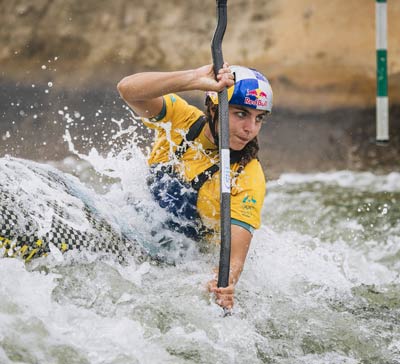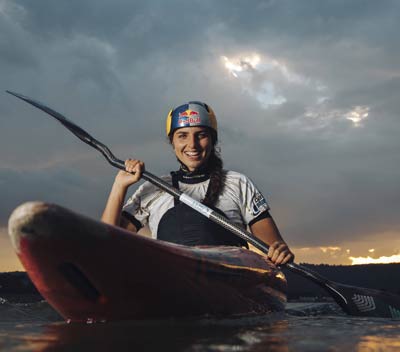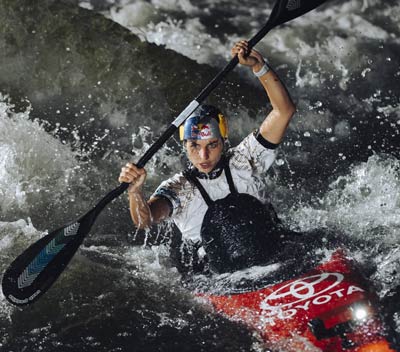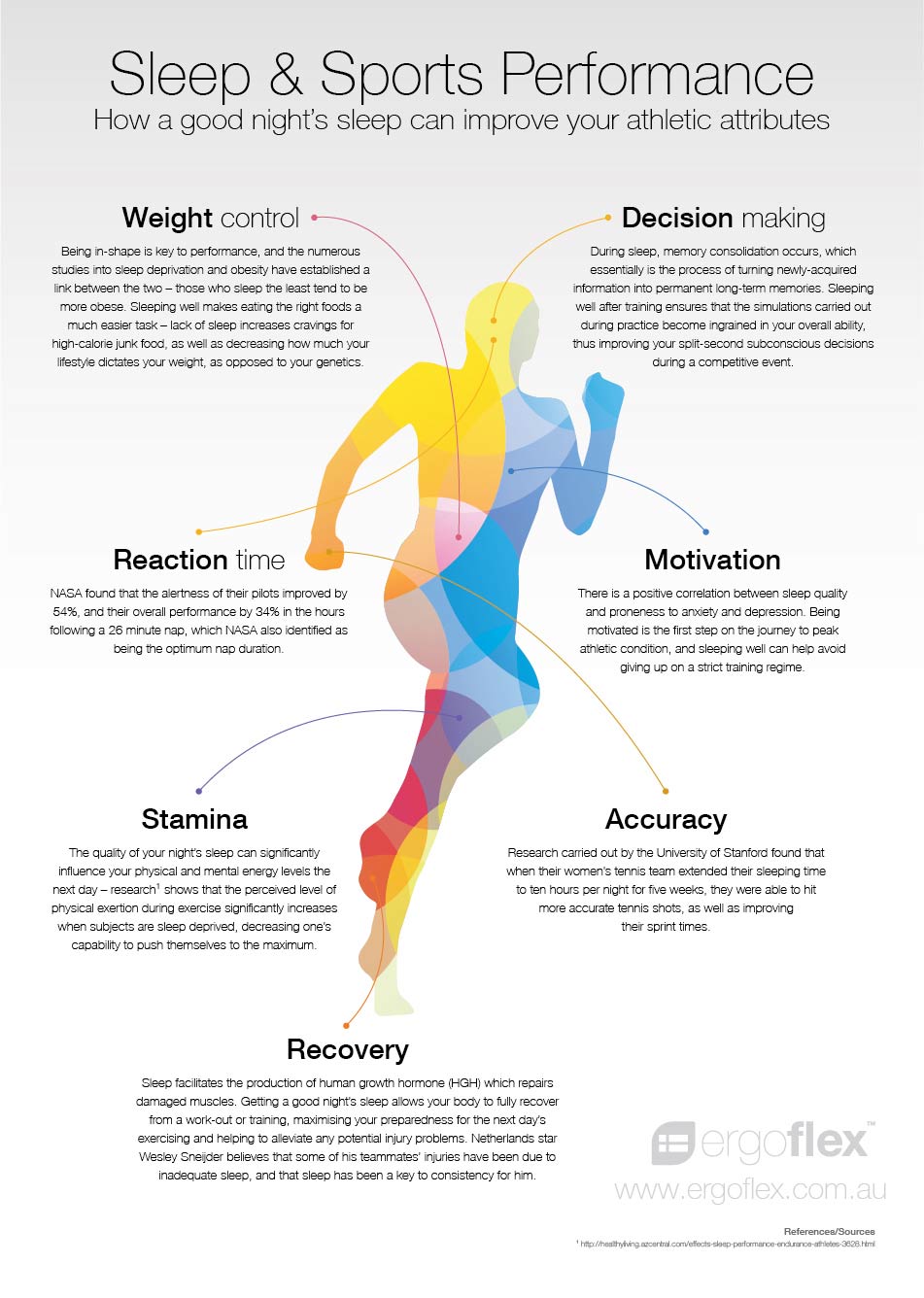Jessica Fox - Talking Sleep and her Ergoflex Mattress
29-05-2018

Introducing our brand ambassador Australia's canoeing star Jessica Fox, who explains how a good night's sleep is key to her performance on the water, and her recovery off it.
Sleep isn't the first thing that comes to mind when you think about sporting achievement, but in fact it plays a key role and is something that every elite athlete prioritises in their day-to-day lives.
Ergoflex has a proud history of providing consistently great sleep to sportspeople at the very top of their game. Jessica Fox is also among the many top-level athletes who consider Ergoflex mattresses as an important part of their regimes.
The particular benefits of the Ergoflex mattress for athletes can be distilled down into two main areas – quality sleep and optimal support.
Sleep is linked to sports performance in some surprising ways. As well as being essential for restoring physical and mental energy, sleep also influences weight, motivation, stamina levels, decision making, memory performance and reaction times – all vital components of success in sport. The bulk of the body’s recovery from exertion also comes during sleep, as this is when the body creates the naturally-restorative HGH, making it absolutely key to making gains and avoiding injury. Ergoflex’s body-cradling comfort encourages quicker transition to sleep, as well as unbroken rest throughout the night. Fewer night-time awakenings means you’re able to naturally transition through the various phases of sleep, rejuvenating the body and mind in the process – the perfect preparation for sporting excellence.
Whether training or competing in events, the body goes through a lot of punishment during sports, so it needs the right support for efficient recovery. An inconsistent or unsupportive mattress won’t just disrupt sleep, it’ll also put unnecessary additional stress on the body, creating aches and pains that come after a bad night’s sleep. The Ergoflex 5G’s high-density visco-elastic layer ensures that every part of the body that comes into contact with the mattress is optimally supported throughout the night – so areas that can typically suffer on lesser mattresses, like the lower back, hips and legs, get the support that they need during sleep.
By promoting consistently deep sleep and body-cradling support, the Ergoflex 5G is the perfect partner for discerning athletes who simply can’t take risks with their sleep quality.
We spoke to our brand ambassador Jessica Fox about her career and fitness lifestyle, and the role that sleep plays in it.
Q: Ergoflex: When did you first turn pro?
Jessica Fox: We are not really a professional sport in the same way as some of the Football codes or Tennis or Surfing in that we don’t get paid the same! But the attitude and lifestyle of training and competition is very much professional, spending over 6 months of the year travelling and competing. I have been on the international circuit since 2010 but I would say more ‘pro’ since 2014.
Q: Ergoflex: Why canoeing? Did you have a natural aptitude for the sport from an early age, or is it something you have had to really work at?
Jessica Fox: My parents were both canoe slalom athletes in the 80s and 90s and competed at the Olympics for France and GB. I was a very sporty kid and tried all different sports, with swimming being a favourite. I eventually picked up the paddle when I was about 12 and really enjoyed the whitewater rapids and have stuck with it ever since!
Q: Ergoflex: As an aspiring professional in your earlier years, what advice were you given that you now agree or disagree with?
Jessica Fox: I was always told ‘keep it simple and do what you know how to do’ especially for competitions – not to get ahead of yourself. It’s plain and simple but I still remind myself to keep it simple even in the biggest races. Another quote / advice I was given that I still agree with: You will always fall to the level of your training when in competition so always bring your best intention and attitude to get the best out of yourself in training and lift your skills.
 Q: Ergoflex: When was your first ‘professional’ race and how old were you? What was that experience like?
Q: Ergoflex: When was your first ‘professional’ race and how old were you? What was that experience like?
Jessica Fox: My first international race was in 2010 at the junior world championships in France. I was born in France and my mother is French and the crowd really embraced me! It was an amazing atmosphere and very memorable event because I won two gold medals to become junior world champion, my first major title.
Q: Ergoflex: What was it like racing at the Olympics?
Jessica Fox: The Olympics have been a dream of mine for many years and to qualify for the London Games at 18, fresh out of school was a surreal experience. My goal was to make the final, so to come away with an Olympic silver medal was absolutely incredible. Everything about those games was special – the atmosphere was electric, the crowds were loud and huge and being a part of a big Australian team and wearing the Green and gold was so inspiring. I will always remember those emotions. Rio was a different experience but still so special. It was vibrant and wild. For me, it was a games about resilience and growth and I was very proud to win a second Olympic medal .
Q: Ergoflex: Would you say that science and research designed to improve nutrition, fitness, rest/recovery, and ultimately success is now taken far more seriously than ten years ago?
Jessica Fox: Definitely. We are becoming more and more resourceful and sport is more and more professional even at the amateur level because science, technology, nutrition, recovery etc can contribute to that 1% that can make a difference.
Q: Erogflex: Do you feel like canoeing has taken its toll on your body?
Jessica Fox: Canoeing on flatwater is a lot more safe and relaxed, on whitewater it is a bit more demanding on the body. I have had a few injuries but thankfully nothing serious (touch wood!) but as I get older I am more aware of the importance of physio and prehab and strength training to make sure my body is well prepared for what I need to do on the water.
Q: Ergoflex: After a race, what is the post-race recovery programme like?
Jessica Fox: I usually cool down on the flatwater for about 10 minutes, then have an ice bath (unless we are overseas in a really cold country!), depending on how much time I have between races I might have a recovery massage, some food like a banana, nuts or protein bar/shake while I do video analysis of the race and sleep!
Q: Ergoflex: Has this changed dramatically over the years?
Jessica Fox: When I was younger I might get off the water straight away without much cool down. As I’ve gotten older I have started using physios and ice baths etc.
 Q: Ergoflex: How wold you rate the importance of sleep?
Q: Ergoflex: How wold you rate the importance of sleep?
Jessica Fox: THE MOST IMPORTANT! Love my naps. Sleep takes priority over any other form of recovery for me (e.g. protein powders and compression gear etc )
Q: Ergoflex: Have you always been aware of sleep’s role in fitness, or is it something that has developed with your experience?
Jessica Fox: I’ve always prioritised sleep, maybe without realising how important it was in helping me be in the best shape. As I’ve gotten older and become more aware of research, I make sure I always get a good night sleep and a nap if time permits in the day.
Q: Ergoflex: Is nutrition is a big part of your programme? What would you recommend as a sleep-friendly food or drink? Do you have a routine or certain foods or drinks that you consume before bed?
Jessica Fox: I don’t like eating too close to sleeping, I usually try to have dinner fairly early so I have time to digest a bit. I like a cup of herbal or green tea in the evening before bed.
Q: Ergoflex: Does Canoeing Australia or your club place any particular emphasis on sleep’s importance with recommendations and advice, or is it just expected of you to manage your own sleep regime?
Jessica Fox: Our coaches, physiologists and physios stress the importance of good sleep. It can sometimes be hard because every athlete has a life outside of sport with uni/work etc. and sometimes these need to take priority at certain times.
Q: Ergoflex: Could any of your fellow pro’s use some sleep education?
Jessica Fox: Of course! I think we are all generally quite good with sleep… but perhaps the ones who like to party on weekends and train after! I know I can’t function well on less than 7 hours sleep!!!!
Q: Ergoflex: Your career has taken you around the world – did you find any cultural differences when it came to acknowledging sleep’s importance? Any differences to France?
Jessica Fox: The biggest difference I’ve noticed is more in terms of the daily rhythm. In Spain for example, there is a set time for siesta where all shops and schools close in the afternoon between 2 and 4 and people rest. They also tend to be night animals and eat really late – like 10pm! In Australia I find we tend to make the most of the day and get up early while in Europe 8am is early!
Q: Ergoflex: What’s your regular sleep routine and duration?
Jessica Fox: I value sleep and go to bed pretty early some may call me a nanna for a 23 year old! Generally I’m in bed by 9.30/10 and up by 6.30/7 am. I aim for 9 hours sleep and I know that when I get less than 6 or 7 I really feel the difference. If I’m feeling a bit restless, or stressed I also listen to a relaxation/mindfulness tape (there are heaps on youtube) to help relax and focus on my breathing. If I have a big training day I might have a 30 minute nap in the afternoon.
 Q: Ergoflex: Does your sleep routine change when you’re away from home?
Q: Ergoflex: Does your sleep routine change when you’re away from home?
Jessica Fox: It depends where we go and what time our training sessions are in different venues so the time I go to bed/wake up may change but I still try to get 9 hours.
Q: Ergoflex: Do you use any wearable technology to monitor your sleep quality?
Jessica Fox: No. I did use a sleep tracking device on a training camp in London one year and got the highest scores in the group! But I don’t like to wear anything on my head or have my phone or watch on when I sleep.
Q: Ergoflex: What’s your one recommendation for a good night’s sleep?
Jessica Fox: It’s hard to find just one! I think a good mattress and pillow makes a big difference. But also your activity before bed – I try to limit blue screen time and stop at least 30 mins before sleep.
Q: Ergoflex: Like a lot of pro cyclists, footballers and pro rugby players, you sleep on an Ergoflex mattress. In your opinion, what makes the Ergoflex so popular with elite athletes?
Jessica Fox: I think the technology is appealing – as athletes, sleep is super important to our recovery and injury prevention, so the fact that it is designed to be ergonomically efficient means we know it is
Q: Ergoflex: How would you describe your Ergoflex mattress? What would you say was the single biggest difference you’ve found since using the Ergoflex mattress? Has it improved your sleep?
Jessica Fox: I was used to sleeping on a really hard mattress and the Ergoflex felt really soft in comparison but after a few days I found my sleep was uninterrupted and I woke up feeling good in my back. I recently got back from overseas and it’s always when you are away from home sleeping on different mattresses that you notice the difference the most. Nothing like sleeping in your own bed again!!
Q: Ergoflex: What next for Jessica Fox?
Jessica Fox: I hope to build on my successes from last year and perform well at all World Cup events including the World Championships in Rio in September. I will also continue my training and preparation for Japan 2020.
* All photography courtesy of Red Bull Media Services.

*Offer code entitles $150 discount on King Single, Double, Queen, and King mattress, and $75 discount on Long Single and Single mattress. Excludes all accessories.

Team Ergoflex Australia: Meet our team of ambassadors.
